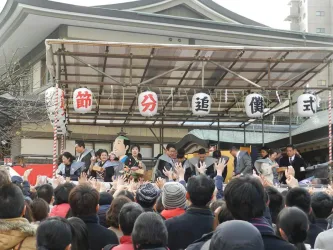Here is an overview of Japanese national holidays and some of the other most important annual nationwide events. The banks and government offices close on a public holiday in Japan, but shops or restaurants are opened. Please be aware that traffic tends to be heavy on a national holiday and sightseeing spots tend to get very crowded. If it is also a seasonal flower or colored leaves season it becomes even busier.

National Holidays in Japan (Q1)
- January 1 (national holiday)
New Year (shogatsu)
This is the most important holiday in Japan. While only January 1st is designated as a national holiday, many businesses remain closed through January 3. People in Japan go to the shrine and pray for our prosperity in the new year during this time. - Second Monday of January (national holiday)
Coming of Age (seijin no hi)
This is coming of age day, a day during which 20-year-old men and women are celebrated.
- February 3
Beginning of spring (setsubun)
Setsubun is not a national holiday but it is celebrated at shrines and temples nationwide. On this day, we throw away beans while saying ” Devils out! Happiness in !” and people eat the same number of beans as their age. - February 11 (national holiday)
National Foundation Day (kenkoku kinenbi)
According to the earliest Japanese history records, on this day in the year 660 BC, the first Japanese emperor was crowned. - February 14
Valentine’s Day
In Japan, women give chocolates to men on Valentine’s Day. It is not a national holiday. - February 23 (national holiday)
Emperor’s Birthday (Tenno tanjobi)
The birthday of the current emperor is always a national holiday. If the emperor changes, the national holiday changes to the birthday of the new emperor.
- March 3
Doll’s Festival (Hina matsuri)
On this day, families with girls wish their daughters a successful and happy life. Hina Ningyo (dolls) are displayed in the house together with peach blossoms. - Around March 20 (national holiday)
Spring Equinox Day (shunbun no hi)
Graves are visited during the week (ohigan) of the Equinox Day.
National Holidays in Japan (Q2)
- April 29 (national holiday): Golden week start from this day.
Showa Day (Showa no hi)
The birthday of former Emperor Showa. Before 2007, April 29 was known as Greenery Day (now celebrated on May 4). Showa Day is part of the Golden Week.
- May 3 (national holiday)
Constitution Day (kenpo kinenbi)
A national holiday remembering the new constitution, which was put into effect after the war. - May 4 (national holiday)
Greenery Day (midori no hi)
Until 2006, Greenery Day was celebrated on April 29, the former Emperor Showa’s birthday, due to the emperor’s love for plants and nature. It is now celebrated on May 4 and is part of the Golden Week. - May 5 (national holiday)
Children’s Day (kodomo no hi)
Also called boys’ festival.
National Summer Holidays in Japan (Q3)
- July/August 7
Star Festival (tanabata)
Tanabata is a festival rather than a national holiday. - Third Monday of July (national holiday)
Ocean Day (umi no hi)
A recently introduced national holiday to celebrate the ocean. The day marks the return of Emperor Meiji from a boat trip to Hokkaido in 1876.
- August 11 (national holiday)
Mountain Day (yama no hi)
Newly introduced in 2016, this national holiday celebrates the mountains. - July/August 13-15
Obon
Obon is a Buddhist event to commemorate deceased ancestors. This period, most Japanese people go back to their home town to celebrate this holiday with family for their ancestors. Many people are off work this week.
- Third Monday of September (national holiday)
Respect for the Aged Day (keiro no hi)
Respect for the elderly and longevity are celebrated on this national holiday. - Around September 23 (national holiday)
Autumn Equinox Day (shubun no hi)
Graves are visited during the week (ohigan) of the Equinox Day.
National Holidays in Japan (Q4)
- Second Monday of October (national holiday)
Health and Sports Day (taiiku no hi)
On this day in 1964, the Olympic Games in Tokyo were opened.
- November 3 (national holiday)
Culture Day (bunka no hi)
A day for the promotion of culture and the love of freedom and peace. - November 15
Seven-Five-Three (shichigosan)
Girls aged three and seven and boys aged three and five are celebrated on Shichigosan around November 15, and families go to the shrine to pray for their good health and growth. The children (boys and girls) wear kimono and have their pictures taken. After the ceremony, all the family members get together at a restaurant and have a great dinner. - November 23 (national holiday)
Labor Thanksgiving Day (kinro kansha no hi)
A national holiday for honoring labor.
- December 24-25
Christmas
Christmas is not a national holiday, but shopping malls are heavily decorated in the weeks leading up to Christmas, and many people follow local Christmas traditions, such as eating chicken at KFC and a Christmas cake or having a fancy dinner outside with one’s partner. - December 31
New Year’s Eve (omisoka)
December 31 is not a national holiday. but generally, this is a day to take a rest. Many families gather and have dinner, and at midnight, Japanese people often eat soba noodles for longevity.
Your Japan Tour
If you are thinking about making a trip to Japan, as seasoned Japan experts we can help you create your perfect Japan tour, including expert guides who can add to your holiday with their extensive knowledge of Japanese culture and they know just where to go on a national holiday for the best experience. Contact us to start planning your unforgettable holiday to this fascinating country full of once-in-a-lifetime experiences, culture, history, nature, and delicious food!